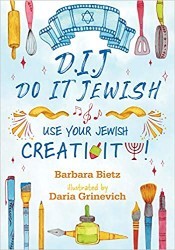My friend, Michelle Markel, has been interviewed by me before so for her new release we decided to try something new. To many authors, new books feel like their children. Michelle’s latest creative offspring is Brave Girl: Clara and the Shirtwaist Makers’ Strike of 1909, illustrated by Melissa Sweet and published by Balzer & Bray. Brave Girl is about a Clara Lemlich, a young immigrant girl who became a labor activist. Without fear, she fought for what was right. I’m proud to know her!
Michelle was generous enough to share her her deepest parental thoughts about Brave Girl with us.
 Barbara Bietz: When was the story conceived?
Barbara Bietz: When was the story conceived?
Michelle Markel: In 2007. After writing two picture book biographies about male artists, I was ready for something new, a story about an extraordinary Jewish woman. My husband, an anthropology professor who teaches gender studies, suggested I read up on the immigrant women activists of the garment industry. I researched not only Clara Lemlich, but also Rose Schneiderman, who became an influential friend of Eleanor Roosevelt, and Pauline Newman, who later was an advisor for the Department of Labor.
BB: Does Brave Girl take after any family members?
MM: Though none of my relatives were in the NYC needle trades, my dad was an airline mechanic and president of his local machinists’ union, and participated in a successful strike. I grew up with compassion for working people.
BB: When did the story’s personality start to emerge?
MM: I noticed a fierce attitude developing in the first few months. I tried not to discourage it, since Clara had a rebellious streak. (When she was growing up in the Ukraine, her father forbade her to learn Russian. Clara studied in secrecy, stowing her books under the meat pan. When her father discovered and burnt them, she bought more and hid them in the attic.)
BB: What was your parenting philosophy? Structure or Freedom?
MM: I’m not a rigid outliner. My stories do best in unrestricted environments. Only later do I see what elements to cut. Everything you eliminate makes the rest of the text shine more. I understood, with
time, that Brave Girl didn’t want to be a traditional biography. It wanted to be an account of a woman’s courageous leadership in a collective action — the 1909 strike.
BB: Were there problems with separation anxiety?
MM: Not at all. Sometimes I got blocked, and left the story alone for a few weeks. The story didn’t seem to mind. In fact, this worked out best for the both of us. It was calmer and more flexible as a result.
BB: Did you notice any annoying habits?
MM: Yes. One sentence stubbornly tormented me for a whole summer. I took it out. I put it back in. Out. In. Out. In. If the words wanted to be included that badly, there had to be a reason.
BB: How did you cope with the challenges of parenting?
MM: I believed in the importance of the material. Children need to see examples of how wrongs can be righted in a democracy. They need to know that heroism isn’t gender specific.
BB: There are few picture books about labor activists. Were you worried that Brave Girl would be “different”?
 MM: That was a concern. But when you love a child this much, you just want it to blossom into its full potential. You have to let it become its bold wonderful self, and not think about what else is out there. Being different can make you stand out, in a good way.
MM: That was a concern. But when you love a child this much, you just want it to blossom into its full potential. You have to let it become its bold wonderful self, and not think about what else is out there. Being different can make you stand out, in a good way.
BB: Did Brave Girl have any recurring dreams?
MM: It dreamt of one day coming to life as a beautiful picture book and making its way into the hands of teachers and children. And it happened. Melissa Sweet’s vibrant colors, her use of stitching and fabric and vintage newsprint give texture and dimension to the book. It is published this season, to celebrate Women’s History Month!
I have to say — if you have faith, dreams really do come true.
BB: Thanks, Michelle! Best of luck with your new “baby!”
Barbara Bietz is a freelance writer and children’s book reviewer. She is currently a member of the Sydney Taylor Book Award Committee. Barbarais the author of the middle grade book, Like a Maccabee. She has a blog dedicated to Jewish books for children at www.BarbaraBBookBlog.Blogspot.com.



